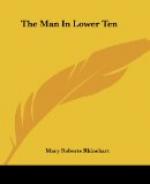I had not been home for thirty-six hours, since the morning of the preceding day. Johnson was not in sight, and I let myself in quietly with my latchkey. It was almost midnight, and I had hardly settled myself in the library when the bell rang and I was surprised to find Hotchkiss, much out of breath, in the vestibule.
“Why, come in, Mr. Hotchkiss,” I said. “I thought you were going home to go to bed.”
“So I was, so I was.” He dropped into a chair beside my reading lamp and mopped his face. “And here it is almost midnight, and I’m wider awake than ever. I’ve seen Sullivan, Mr. Blakeley.”
“You have!”
“I have,” he said impressively.
“You were following Bronson at eight o’clock. Was that when it happened?”
“Something of the sort. When I left you at the door of the restaurant, I turned and almost ran into a plain clothes man from the central office. I know him pretty well; once or twice he has taken me with him on interesting bits of work. He knows my hobby.”
“You know him, too, probably. It was the man Arnold, the detective whom the state’s attorney has had watching Bronson.”
Johnson being otherwise occupied, I had asked for Arnold myself.
I nodded.
“Well, he stopped me at once; said he’d been on the fellow’s tracks since early morning and had had no time for luncheon. Bronson, it seems, isn’t eating much these days. I at once jotted down the fact, because it argued that he was being bothered by the man with the notes.”
“It might point to other things,” I suggested. “Indigestion, you know.”
Hotchkiss ignored me. “Well, Arnold had some reason for thinking that Bronson would try to give him the slip that night, so he asked me to stay around the private entrance there while he ran across the Street and got something to eat. It seemed a fair presumption that, as he had gone there with a lady, they would dine leisurely, and Arnold would have plenty of time to get back.”
“What about your own dinner?” I asked curiously.
“Sir,” he said pompously, “I have given you a wrong estimate of Wilson Budd Hotchkiss if you think that a question of dinner would even obtrude itself on his mind at such a time as this.”
He was a frail little man, and to-night he looked pale with heat and over-exertion.
“Did you have any luncheon?” I asked.
He was somewhat embarrassed at that.
“I—really, Mr. Blakeley, the events of the day were so engrossing—”
“Well,” I said, “I’m not going to see you drop on the floor from exhaustion. Just wait a minute.”
I went back to the pantry, only to be confronted with rows of locked doors and empty dishes. Downstairs, in the basement kitchen, however, I found two unattractive looking cold chops, some dry bread and a piece of cake, wrapped in a napkin, and from its surreptitious and generally hang-dog appearance, destined for the coachman in the stable at the rear. Trays there were none—everything but the chairs and tables seemed under lock and key, and there was neither napkin, knife nor fork to be found.




